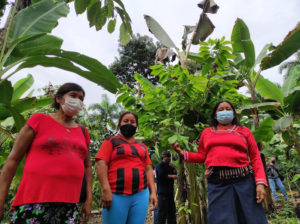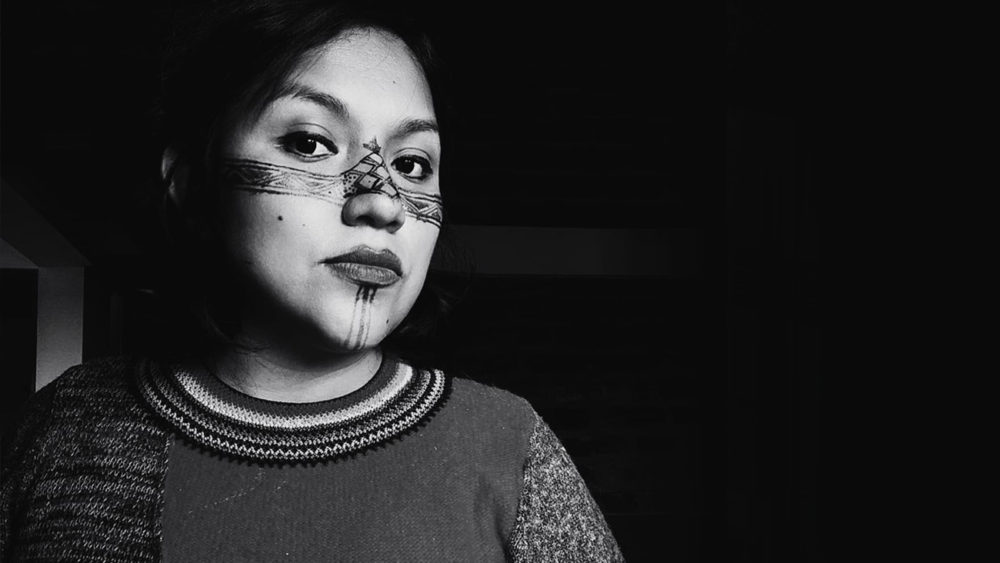Indira Vargas is a 30 year old Amazonian woman, who, during the most critical stage of the COVID-19 pandemic in 2020, worked as the vicepresident of the Kichwa community of the Unión Base of the Province of Pataza, in Ecuador.
During this stage, she had the initiative to document the ancestral medicine that Amazonian women used to combat the pandemic. The result was published in the “Manual of ancestral use of medicinal plants for the mitigation of COVID-19 in Amazonian Kichwa communities”.
Through this document, Indira seeks the recognition of indigenous ancestral knowledge in health, especially in the context of the pandemic that has affected the Western world as well as the Indigenous world. On this occasion, PROAmazonía, a program of the Ministry of the Environment, Water and Ecological Transition and the Ministry of Agriculture and Livestock, with UNDP’s support, chatted with Indira about her experience.
How did your community cope with the COVID-19 pandemic?
In 2020, nobody knew what was happening. The pandemic was something new, but grandparents and wise men were connected to medicines. They said serious illnesses are coming. When the state of emergency was decreed, we kept ourselves and called an urgent assembly meeting; we decided to close the roads to avoid contagion. However, in mid-May three people fell ill. We learned that some families were sick, it was not normal. When an elderly woman got sick, we almost lost her. My grandfather died in a Shuar community. It was very hard and a blow for everyone, not being able to say goodbye in a traditional way. At one point, in mid-June and July, 80% of the people in Unión Base were infected.
It was at that time that some moms said that there were plants that could help us.
What was the role of women in facing COVID-19?
With the advice of the moms and grandmas we decided to go to the plants. As vice president of the community, I started, with the aid of other women, to make some preparations. Our peers had that knowledge to relieve fever, joint pain, purify the blood to complement and fight the disease. We, as a group of women, collectivize and coordinate to manage. We talked to each other and prepared recipes to face the disease. It was not a cure, but it helped those infected to feel better.
And the ingredients were native to the forest?
All of them came from the chakra, which is a place were women, aunts and moms get together. There women put all the physical, mental and spiritual effort. It is full of ancestral knowledge transmitted from our grandmothers so that the product grows in abundance. The essence of the women allows greater connectivity with the jungle, a spiritual connection with the chakra and the earth. The moms went to the jungle and started a preparation with barks, with leaves, garlic leaaves, guayusa, chrikaspi. Thus, we find ways to lower fever and symptoms of the disease.
Where does knowledge come from, who transmits it?
Our grandparents told us about such serious diseases during colonization. It is not the first pandemic and Indigenous Peoples have studied plants, seeing how animals consume plants and the effects of each of the forest plants. This knowledge is millenary. That is why for us it is important to know it. We learned with the pandemic; it made us Indigenous Peoples reflect a lot to promote ancestral knowledge of plants, midwifery, medicine. Now we do have that knowledge by our side.
Is that why you decided to write the manual?
Our grandmothers pass on legends, knowledge and myths to us, which help us strengthen the future. For me and for many companions, the decision was to use knowledge and care technology to write the “Manual of ancestral use of medicinal plants for the mitigation of COVID-19 in Amazonian Kichwa communities”. We put together contributions and with this manual we took a step to encourage youth and other women to gather knowledge, and expand it with feedback from other peoples and nationalities.
What is the importance of protecting nature in current times?
These are very hard times; the climate crisis in the world, the fires and floods make us wonder: how can we heal? The force of nature makes us reflect. From the Amazonian context, there is currently a consciousness to restore forests. Now we encourage communities to have that awareness as well; we are reforesting, taking care of water, we encourage them to cultivate the land with food, and that knowledge is protected.
Clic on the link to download the Manual

Photo: Indira Vargas
Description: Amazonian Women went to the chakras, to the jungle, to extract plants and tree bark, to obtain supplies for the preparation of medicines.

Photo: Indira Vargas
Description: The matico was one of the plants used for the recipes to fight COVID-19.
Author: Martín Pastor – Social Communication Technician, Writing and Editing PROAmazonía.
 Español
Español English
English

Comments are closed.